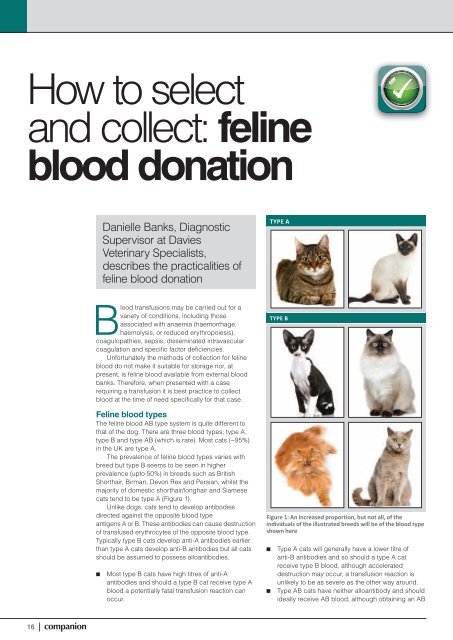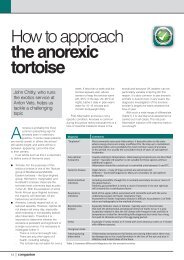Companion May 2012 - BSAVA
Companion May 2012 - BSAVA
Companion May 2012 - BSAVA
Create successful ePaper yourself
Turn your PDF publications into a flip-book with our unique Google optimized e-Paper software.
How to select<br />
and collect: feline<br />
blood donation<br />
16 | companion<br />
Danielle Banks, Diagnostic<br />
Supervisor at Davies<br />
Veterinary Specialists,<br />
describes the practicalities of<br />
feline blood donation<br />
Blood transfusions may be carried out for a<br />
variety of conditions, including those<br />
associated with anaemia (haemorrhage,<br />
haemolysis, or reduced erythropoiesis),<br />
coagulopathies, sepsis, disseminated intravascular<br />
coagulation and specific factor deficiencies.<br />
Unfortunately the methods of collection for feline<br />
blood do not make it suitable for storage nor, at<br />
present, is feline blood available from external blood<br />
banks. Therefore, when presented with a case<br />
requiring a transfusion it is best practice to collect<br />
blood at the time of need specifically for that case.<br />
Feline blood types<br />
The feline blood AB type system is quite different to<br />
that of the dog. There are three blood types; type A,<br />
type B and type AB (which is rare). Most cats (~95%)<br />
in the UK are type A.<br />
The prevalence of feline blood types varies with<br />
breed but type B seems to be seen in higher<br />
prevalence (upto 50%) in breeds such as British<br />
Shorthair, Birman, Devon Rex and Persian, whilst the<br />
majority of domestic shorthair/longhair and Siamese<br />
cats tend to be type A (Figure 1).<br />
Unlike dogs, cats tend to develop antibodies<br />
directed against the opposite blood type<br />
antigens A or B. These antibodies can cause destruction<br />
of transfused erythrocytes of the opposite blood type.<br />
Typically type B cats develop anti-A antibodies earlier<br />
than type A cats develop anti-B antibodies but all cats<br />
should be assumed to possess alloantibodies.<br />
■■ Most type B cats have high titres of anti-A<br />
antibodies and should a type B cat receive type A<br />
blood a potentially fatal transfusion reaction can<br />
occur.<br />
TYpe A<br />
TYpe B<br />
Figure 1: An increased proportion, but not all, of the<br />
individuals of the illustrated breeds will be of the blood type<br />
shown here<br />
■■ Type A cats will generally have a lower titre of<br />
anti-B antibodies and so should a type A cat<br />
receive type B blood, although accelerated<br />
destruction may occur, a transfusion reaction is<br />
unlikely to be as severe as the other way around.<br />
■■ Type AB cats have neither alloantibody and should<br />
ideally receive AB blood, although obtaining an AB



